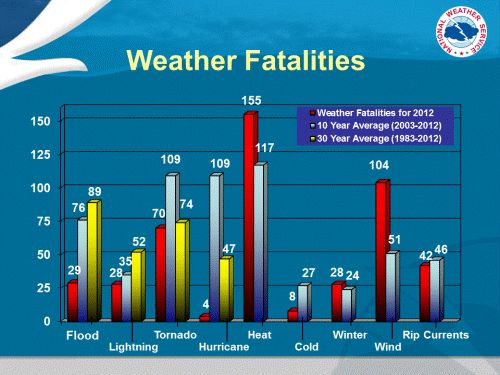
Photo Courtesy of NOAA.gov
There are a lot of ways to warm up when a power failure cuts off your heat supply. But what if power is your first line of defense against heat stroke? Here are some measures you can take to beat the dangerous heat in an emergency situation. 1. Make water your best friend. First and foremost, stay hydrated. In severe heat, experts recommend drinking not just copiously, but frequently in order to replace fluids lost through sweat. In addition to drinking it, we can maximize water’s cooling properties in other ingenious ways. Wetted towels hung near open windows will cool a breeze; a lukewarm bath or shower can lower body temp; and a cold compress, especially on the body’s pulse points (wrist, armpit, and groin) can do the same job more efficiently. 2. Unconditioned air can still be controlled. Keep the atmosphere from reaching the stifling point and Replace the cool where it’s hiding by being air-wise. Use heavy fabric to block heat-generating light coming through windows. Cook outside in order to keep smoke, steam, and other hot vapors from invading your living space. Besides keeping hot air at bay, it’s important to Replace ways to invite cool air in. Open windows at night to create a cool cross breeze, remembering to close them before the sun heats that breeze up again. And if you can’t keep the main living area cool enough to be comfortable, go lower—dark basements stay cooler, and even a downstairs family room floor will be a few degrees better than a bed upstairs. 3. Work with, not against, your body’s cooling mechanisms. A nice tall drink may sound perfect, but caffeine, alcohol, and excessive sugar actually increase your body’s need for water. Even worse, caffeine is a diuretic, which means it will cause your body to lose more water. Skip the soda and opt for water. Counterintuitively, spicy food may actually help your body cool down. The capsaicin in certain peppers and spices induces sweating, which cools the body down. Just be sure to replace the sweat with plenty of fluids. Other ways to regulate your body’s temperature include avoiding unnecessary exertion; wearing light, loose, cotton clothes; and minimizing insulation when you sleep (floor is better than bed, alone is better than cuddling, etc.). 4. Be stingy (and creative!) with power. Don’t open refrigerators and freezers unnecessarily. Use coolers and buy ice to keep cold food handy day to day. An additional perk might be the functional air conditioning in a grocery store or other public building. And don’t forget to keep batteries stored for handheld fans. Sunshine is pleasant, but if the bulk of our warm weather preparations have to do with fitting into our swimsuit or getting a nice base tan, we could end up in more danger than we anticipate. Stay safe and cool as the weather warms up! Sources: http://www.medicinenet.com/script/main/art.asp?articlekey=63080 http://greatist.com/happiness/tricks-to-sleep-in-the-heat http://www.safeelectricity.org/information-center/library-of-articles/63-storm-recovery-springsummer/315-keep-your-cool-while-the-powers-out http://www.accem.org/pointers/eppjul11.pdf
